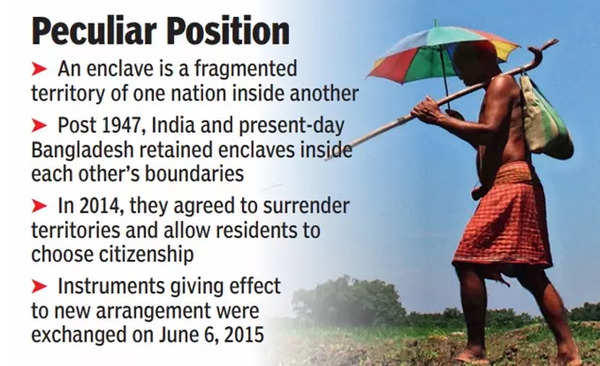Nine years later, they are all legal Indian nationals but do not have papers for land and homes they possess.
“We were told that we would get documents for the land (before the treaty was signed). A land survey was conducted, and a flawed khatian (land survey record) was made, in which the land ownership claims did not match the survey result. A new khatian was supposed to be made, and we were to get papers for our land. But that has not happened yet,” says Saddam Hussein of Madhya Masgaldanga, an erstwhile enclave in Cooch Behar’s Dinhata.
The dwellers of the enclaves, who had land chunks, still enjoy those. They live, cultivate, raise cattle and goats on the land they call their own but do not have documents to prove it. “We are hopeful of getting rights for our land someday,” Hussein says.
Hari Barman is one of the 922 people who crossed into the Indian mainland from former Indian enclaves in Bangladesh. “Every family was allotted a 2 BHK flat to live in, in Cooch Behar. Although the district administration had then given us possession certificates in our names for the flats we live in, these are still not registered and mutated in government records,” Barman said.

Barman, who came from the erstwhile Dahala Khagrabari I enclave in Pancha garh district, Bangladesh, lives with 477 others in an apartment on the outskirts of Haldibari. Two similar apartments were built in Dinhata and Mekhliganj to accommodate the remaining 444 former Indian enclave dwellers.
There are around 14,000 voters from the former enclaves in Cooch Behar and Jalpaiguri parliamentary seats, which vote in the first phase on April 19, and observers believe the delay in disbursing land and flat documents will have an impact, mostly in Cooch Behar, where there are 13,000 voters.
“There are nine MLAs in Cooch Behar and two MPs for the erstwhile enclave dwellers, both from BJP and TMC. But no one raised the issue in state assembly or Parliament.
This is the biggest issue for them in this election,” a local neta, who works in the former enclaves, said.
Dipak Kumar Bhattacharya, president of Trinamool’s Dinhata II block, where most of the enclaves are, said the matter would take time to resolve. “This is not a normal land-transfer issue,” he said. “This was foreign land, which Centre took possession of and handed over to Bengal govt. The people who have claims on these lands have to be given a hearing and their claims adjudicated by a land tribunal. An initial survey was completed but people had raised objections. The matter is being resolved. It cannot be done quickly, but we hope to complete it in fourfive months.”
Jibesh Biswas, BJP’s Cooch Behar district president, claimed the delay was “deliberate”. “These erstwhile enclaves are used by Trinamool to shelter criminals from Bangladesh. Once the people in the enclaves have their own land papers, they will not allow such illegal activity. What else could be the reason for them not getting land papers for nine years?” he told TOI.
